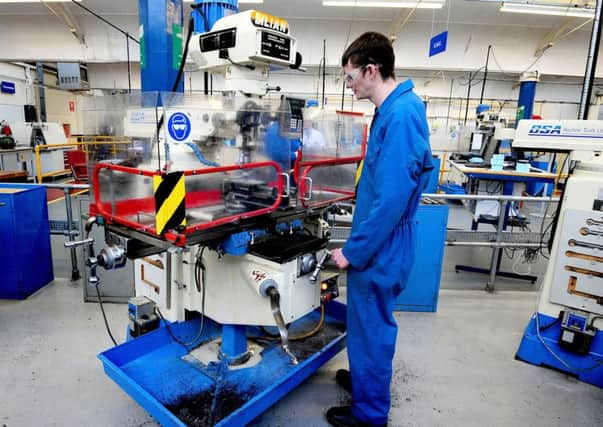Roxanne Stockwell: We need to work together to fill the skills gap


Our regional analysis of the CBI/Pearson Education & Skills Survey, which looks at business hiring trends, found that there is a continuing strong demand in Yorkshire and the Humber for highly skilled employees to drive the economy forward – a massive 85 per cent of those surveyed in the region expect to increase the number of higher-skilled roles over the coming years.
Advertisement
Hide AdAdvertisement
Hide AdHowever, it is not all good news. A big question mark hangs over whether the education system is preparing young people for the demands of the modern-day workplace, with a worrying 60 per cent concerned that as it stands they will not be able to fill those roles.
It is clear the Government recognises the need to upskill the workforce, with a multi-billion-pound commitment to invest in home-grown skills through the apprenticeship levy.
Yet it cannot be right that a year after the implementation of the levy, the numbers of businesses taking on apprentices across the country is falling, including in Yorkshire and the Humber.
Therefore the single biggest thing the Government could do in 2019 to turbo-charge the skills agenda is to listen to what businesses are saying with regards its flagship policy, and to reform the apprenticeship levy accordingly.
Advertisement
Hide AdAdvertisement
Hide AdThis means flexibility to use funds cover a wider range of costs for training, and to make it much easier for businesses to take on apprentices. At a basic level, an apprenticeship is a job, with relevant education and training paid for by employers and where employers release the apprenticeship to study.
So why not keep it to exactly that – and allow employers (and their apprentices) to choose any course they see as relevant, provided employers pay and allow study release, rather than restrict the choice to a narrow range of Apprenticeship Standards?
It also means less bureaucracy to make the system more responsive and more user-friendly. Apprentices generally have to build portfolios of experiences, ticking off numerous requirements in the Apprenticeship Standard.
This seems to be underpinned by the notion that if the work experience itself is not heavily structured the apprentices won’t learn. But studies on the impact of internships and work placements show that students develop professionally and academically from the genuine experience of work – it simply needs to be authentic work, not necessarily structured as a ‘learning experience’.
Advertisement
Hide AdAdvertisement
Hide AdBy rethinking how the levy functions it can fulfil the role it was intended to: support businesses to meet skills needs, improve young people’s opportunities, boost much needed industry-relevant skills, and help diversify career choices beyond the traditional university degree.
At university level, graduate recruitment in the region continues to rise, with the vast majority of employers in the region still considering a 2:1 degree a good measure of academic ability – reflecting the value and prestige of our higher education institutions.
But we musn’t forget that, time and again, businesses tell us that they look – first and foremost – for aptitude and readiness for work when recruiting school, college and university leavers, above purely academic factors.
That businesses lack confidence that they will be able to fill future higher-skilled roles should be a wake-up call for universities and higher education institutions.
Advertisement
Hide AdAdvertisement
Hide AdThere is more scope to build on the progress already made and bring business and the higher education sector closer together to deliver degrees that are designed – and delivered – with the world of work in mind.
At Pearson Business School, we design the content of our degrees in partnership with major employers and SMEs. We make an effort to hire lecturers with direct practical experience in business that they can then deliver in the classroom. This helps ensure that graduates leave university with directly relevant knowledge for the workplace.
At the start of 2019, the encouraging level of demand for higher-level skills should spur us on to take action to ensure the education system is fit to meet it.
Policy-makers can lead the way by listening to what businesses are asking for on apprenticeships – and for their part, businesses and higher education institutions should redouble efforts to work together to shape degrees to ensure graduates leave university ready for the world of work.